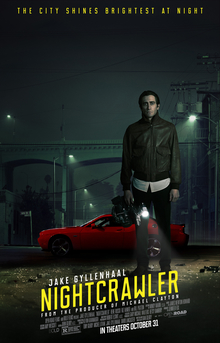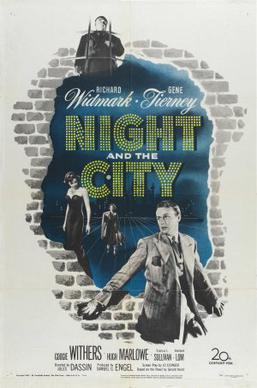
The film, if you don't know, is the origin story of a "stringer," a freelance cameraman who films bloody wrecks and crimes and sells to the local news. The protagonist (Lou Bloom, played by Jake Gyllenhaal) works his way up from a life of petty thievery of copper wire and fencing. It's Gyllenhaal's acting that really makes the movie. He's like a human gecko with his unremitting, unblinking, bug-eyed stare, dashing from shadow to shadow to get his footage and peer fascinatedly into sinks of human suffering and depravity. Skinny and pale, with glistening, glowing eyes, he reminds me of Gollum more than anything else, a nameless thing creeping out from beneath a stone.
How realistic Lou's path to success is I can't comment on, not being privy to trade secrets of the morning news. Now, I never watch the local news. It's all about pushing your buttons to get you to watch massive amounts of commercials. But despite my dislike of the industry, I'll cautiously submit that the events of Nightcrawler are preposterous. Not that that's a bad thing; I'm usually willing to suspend my disbelief if the story is good. But when a stringer sabotages his rival's van to cause a near-fatal wreck you know you've crossed from quasi-reality into fantasy or farce. Not to mention the ridiculously over-the-top footage this news show releases. Lou brazenly uses his growing importance to obtain favors from the much-older morning news director (Rene Russo) to whom he sells his footage, but (strangely) this takes place off screen. It also results in no EEOC complaints.
The film, shot mostly at night in L.A., is visually beautiful. The banal glow of nighttime traffic and corporate signage and street lighting is used to paint picture after picture with supreme artistry, and this, I suppose, is one thing that has earned the comparison with Taxi Driver. The glowing pools of light spilled into a sea of urban darkness and alienation remind me of Edward Hopper's painting Nighthawks as well.
All in all, though, I find myself a bit disappointed with the movie, especially considering the high ratings it's gotten. Based on reviews, I went to the theater in the hope of finding something that really approaches noir in its pointed dialogue and exploration of the seamy underbelly of humanity. Alas, the "dialogue" was mostly dull monologue, and the depravity was flat and cartoonish.
 By way of comparison, consider Sweet Smell of Success (1957). Both movies take place in the electric glare of urban night. Both feature despicable protagonists with high ambitions in media professions. In Sweet Smell, press agent Sidney Falco (Tony Curtis) sinks from depth to depth in trying to ingratiate himself with the great syndicated columnist J. J. Hunsecker (Burt Lancaster). His depravity unfolds gradually, like a flower; this is where much of the interest lies. Hunsecker himself is a monster who takes pleasure in making the elite debase themselves for his favor, to whom the rest of humanity are nothing but insects. He is a great man where Sidney is a small one, but he has one weakness: his unhealthy, creepy attachment to his younger sister.
By way of comparison, consider Sweet Smell of Success (1957). Both movies take place in the electric glare of urban night. Both feature despicable protagonists with high ambitions in media professions. In Sweet Smell, press agent Sidney Falco (Tony Curtis) sinks from depth to depth in trying to ingratiate himself with the great syndicated columnist J. J. Hunsecker (Burt Lancaster). His depravity unfolds gradually, like a flower; this is where much of the interest lies. Hunsecker himself is a monster who takes pleasure in making the elite debase themselves for his favor, to whom the rest of humanity are nothing but insects. He is a great man where Sidney is a small one, but he has one weakness: his unhealthy, creepy attachment to his younger sister.In contrast, Lou Bloom of Nightcrawler is too flatly bad to be shocking. After he crawls out of his hole in the first minutes of the movie, nothing remains to be guessed about his character. His grasping unscrupulousness makes him a cartoon rather than a human being. He crosses no Rubicon. Sidney Falco, on the other hand, crosses line after line, at least in the viewer's estimation. And as to the differences in the scripts, Lou Bloom delivers monologues seasoned with the corporate-world clichés he's picked up from online business courses. These are supposed to be ironic and humorous. The dialogue in Sweet Smell, on the other hand, is barbed, wicked, and witty. It achieves a shocking brutality without the use of a single f-bomb.
 Jules Dassin's Night and the City (1950) is another delightfully bleak and dark urban film about the self-degradation of the social climber. Harry Fabian (Richard Widmark), an American club tout and conman in London, just wants "to be somebody." He's a hustler who goes from one get-rich-quick scheme after another, wearing suits one size too big (literally) and trying (usually unsuccessfully) to swagger his way though trouble. He's "an artist without an art," a phony out to make a name for himself by taking advantage of the real artists, practitioners, craftsmen, and tradesmen (honest or otherwise) with whom he is surrounded. For some reason, Mary, a nightclub singer played by the lovely Gene Tierney, is in love with him. His schemes to set himself up as a wrestling promoter blow up in his face, bringing ruin on pretty much every person he knows, and drawing him into the utmost nadir of moral abjection: betraying Mary. The last act is a frenetic all-night chase through a lurid urban underworld: he's the rabbit, and the greyhounds are in pursuit. Even his last-ditch effort to redeem himself in death fails miserably, as he's strangled by the Strangler and tossed like refuse into the Thames. Just my kind of film! The parallels with Nightcrawler are numerous, but the principal difference once again is that in Night and the City we have a thrilling descent into depravity – a narrative arc – rather than the static depiction given us by Nightcrawler.
Jules Dassin's Night and the City (1950) is another delightfully bleak and dark urban film about the self-degradation of the social climber. Harry Fabian (Richard Widmark), an American club tout and conman in London, just wants "to be somebody." He's a hustler who goes from one get-rich-quick scheme after another, wearing suits one size too big (literally) and trying (usually unsuccessfully) to swagger his way though trouble. He's "an artist without an art," a phony out to make a name for himself by taking advantage of the real artists, practitioners, craftsmen, and tradesmen (honest or otherwise) with whom he is surrounded. For some reason, Mary, a nightclub singer played by the lovely Gene Tierney, is in love with him. His schemes to set himself up as a wrestling promoter blow up in his face, bringing ruin on pretty much every person he knows, and drawing him into the utmost nadir of moral abjection: betraying Mary. The last act is a frenetic all-night chase through a lurid urban underworld: he's the rabbit, and the greyhounds are in pursuit. Even his last-ditch effort to redeem himself in death fails miserably, as he's strangled by the Strangler and tossed like refuse into the Thames. Just my kind of film! The parallels with Nightcrawler are numerous, but the principal difference once again is that in Night and the City we have a thrilling descent into depravity – a narrative arc – rather than the static depiction given us by Nightcrawler.However transgressive Hollywood types nowadays like to paint themselves, they're really too squeamish to depict true depravity. They can't have an unsympathetic protagonist without either making him out to be Robin Hood (and, thus, not unsympathetic) or else turning him into a farcical cipher. What makes Travis Bickle (Taxi Driver) so engrossing a subject is that you see his good points, and see also how isolation and alienation drive him into psychosis. He's a man who just doesn't know how to act, how to relate. You're also kept in suspense as to what his final actions will be, and the fact that he ends up a media hero instead of an assassin owes to pure chance. Louis Bloom, by contrast, has the flatness of allegory, much like Nicole Kidman's character in To Die For (1995), who's also driven by media aspirations. The comparison goes even further, for Lou subverts every person around him just as surely as Kidman's femme fatale. But To Die For is a black comedy, a farce, while Nightcrawler seems to be aiming at something else.
Sweet Smell of Success and Night and the City have protagonists who get what's coming to them. That's partly production codes, I know. But still, a film about human depravity is essentially moralistic (or else boring), and the viewer is left a bit deflated if the worm escapes without being crushed. Really it's not so much a moral requirement as a requirement of the story's logic. Even Nicole Kidman's character ends up under ice, with someone skating on her grave.
Hollywood has largely lost its ability to depict virtue, heroism, goodness. In my opinion this has more to do with unintelligent, uninspired writing and muddled characterization than lack of moral education. Unfortunately for me, it seems to have lost its ability to depict abject depravity as well.

No comments:
Post a Comment